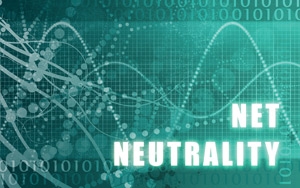Chamber Of Commerce Asks Court To Nix Net Neutrality Rules
- by Wendy Davis @wendyndavis, August 6, 2015
 The U.S. Chamber of Commerce and other business groups are backing broadband providers' attempt to vacate the Federal Communications Commission's new net neutrality rules.
The U.S. Chamber of Commerce and other business groups are backing broadband providers' attempt to vacate the Federal Communications Commission's new net neutrality rules.
"Regulating broadband Internet connectivity under common-carrier provisions subjects one of the most dynamic markets in human history to the clumsy regulatory tools of a bygone era," the Chamber of Commerce, National Association of Manufacturers and Business Roundtable argue in a friend-of-the-court brief submitted this week to the D.C. Circuit Court of Appeals. "It will impose dramatically higher costs on providers and, worse, uncertainty that will make it impossible for companies to predict how they may do business."
The organizations are urging the appellate court to invalidate the FCC's open Internet order, which reclassifies broadband service as a public utility and subjects providers to some of the same common-carrier rules that telephone companies must follow.
advertisement
advertisement
The rules prohibit carriers from blocking or throttling lawful content, and from charging companies higher fees for prioritized delivery. In addition to those so-called bright-line bans, the regulations contain a more ambiguous “general conduct” provision that broadly prohibits carriers from unreasonably impeding consumers and content providers from reaching each other.
The FCC said it will take a case-by-case approach to evaluating whether a particular practice --including pay-per-byte billing models -- violates that general conduct standard.
The cable and telecom industry recently filed arguments asking the appellate court to vacate the rules.
The business groups say in their friend-of-the-court brief that there's no need for new regulations for several reasons, including that the broadband market is too competitive to warrant treatment as a utility.
"Unlike old Ma Bell, the market for broadband Internet access is characterized by fierce competition, rapid expansion, and nimble adaptation, all of which help the broadband market to meet increasing consumer demand for innovative, bandwidth-hungry technologies," the groups contend.
They point to relatively new developments like the emergence of Google Fiber, which recently rolled out 1 GB broadband service in a handful of markets, as evidence of market competition.
"While currently only three percent of the population can choose gigabit service ... multiple companies -- including Comcast, Google, and AT&T -- are building gigabit infrastructure," the groups write.
The Commerce Department reported late last year that 37% of U.S. residents have a choice of two or more broadband providers offering 25 Mbps connections -- the FCC's new definition of broadband.
The trade groups also say the rules' vagueness will increase costs because providers will spend money on legal services instead of investing in their networks.
"The new rules are so unclear that the FCC cannot give a straight answer about the lawfulness of the most basic industry practice: usage-based billing, which allows consumers to select the most economical plan satisfying their needs by providing graduated rates for different usage levels," the organizations write.


